
One of the best things about science fiction is that it lets us try futures on for size. Do you look good in dystopia, finding the hero within while you rise from the wreckage of civilization, raging through the thrills of a dangerous world? Or do you look better invading the spaces that technology is about to open up for us, stumbling into unintended consequences hilarious, heart-wrenching, and severe? Â
The growing solarpunk movement thinks you’d look best in a near future of the sort we’d actually like to live in. The cheerful color scheme complements every complexion. The hope here is that by narrating ourselves into a future where things have turned out well, we can increasingly believe that such a future is possible. Then, armed with that vision of what we could accomplish, we might wake up and start working on it instead of keep sleepwalking into the perfect storm of man-made misfortunes bearing down upon us. Â
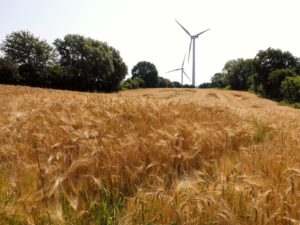 Because we really are sleepwalking right now. To take it a metaphor further, we, the people of Earth, are the deer staring paralyzed into the headlights of global warming, decimated ecosystems, accelerating economic inequality, racism, sexism, homophobia, transphobia, misogyny, failing states, refugees, wars, the pandemic, misinformation and propaganda, totalitarianism, hatred, and division. The here and now could easily turn out to be the prologue of a dystopia that only the most savage will enjoy and it’s hard to imagine there will be much in the way of heroes. Â
Because we really are sleepwalking right now. To take it a metaphor further, we, the people of Earth, are the deer staring paralyzed into the headlights of global warming, decimated ecosystems, accelerating economic inequality, racism, sexism, homophobia, transphobia, misogyny, failing states, refugees, wars, the pandemic, misinformation and propaganda, totalitarianism, hatred, and division. The here and now could easily turn out to be the prologue of a dystopia that only the most savage will enjoy and it’s hard to imagine there will be much in the way of heroes. Â
In fact, we’re doing worse than sleepwalking. Those of us who have been shouting about greenhouse gas emissions and the state of the environment for decades are baffled that the collective response of humanity has been to drive its car faster toward the brick wall. Â
But at the individual level, it’s almost understandable. We are worried but overwhelmed, thinking, how could I possibly do anything about every single issue we’re facing? How could any action I take make any difference at all? So what if we’re on track for having to deal with catastrophic climate change and ecological collapse at the same time that the maximum number of human beings that will have ever simultaneously existed on Earth will all be needing to eat, live somewhere, and have a job. What can I do about that (except move to Montana and start stockpiling guns, ammo, and freeze-dried food)? Â
But, honestly, enough of that narrative, says solarpunk. What a horrible, self-fulfilling prophecy. Better to decide that we can do something about these problems. That we can create a positive future for ourselves, especially if we start solving problems together. After all, problem solving and cooperation are things our species excels at. Â
Would it help get us moving if we started weaving ourselves into narratives in which we have acted to make the future a better place to be? Why don’t we try it? Let’s start creating visions of ourselves having dramatic episodes in fabulous yet feasible futures. Â
That can mean setting stories”’full of human dreams, passions, conflicts, and conundrums”’in a world where we have changed the way we do everything, having gone green, clean, friendly, fair, just, inclusive, and supportive of as many people as possible. It can also mean telling tales set amongst the conflicts that will arise as we ditch fossil fuels for renewables (hopefully) in time to avert global warming disaster. Other stories might involve our attempts to engage safely in sun-shading or carbon sequestration to dial global warming down before we trip over climate tipping points of no return. In these stories, characters could romp through cities that we have revamped into working better for people or through lushly rewilding landscapes made possible by our overhaul of agriculture and our abandonment of overconsumption. Some tales could even be fables woven through with the warmth of cultures that have backed away from today’s every person for themselves attitude in favor of community, belonging, and collective problem solving. Â
But how could stories showing us thriving in the midst of or on the other side of the remaking we need to do to our societies, methods of energy production, and infrastructure help us take action? Â
Well… what if they stoked our enthusiasm for the revolution we are about to undergo that will be as disruptive as the Industrial Revolution that dragged us toward modernity and didn’t rest until it had set the stage for world wars, the collapse of a couple of empires, and the covering of so much of the planet in roads, cars, concrete, and a whole lot more people? Then we would no longer be paralyzed by our fear of such a great set of changes. Â
But even if these stories just normalize little things, like driving electric cars, living near wind farms, having solar panels and heat pumps, or availing ourselves of the extensive and convenient public transportation networks that we deserve to have, they could still help us shake that fear of the future that has been paralyzing us. Â
It is, at any rate, worth a shot, and it’s a shot that Solarpunk Magazine is taking. Â
 You probably haven’t met Solarpunk Magazine yet, as it’s the new kid on the block who hasn’t actually moved in yet. Our first issue will burst upon the scene in January 2022. We already have some great stories, pleasing poems, and fabulous non-fiction lined up for you. Â
You probably haven’t met Solarpunk Magazine yet, as it’s the new kid on the block who hasn’t actually moved in yet. Our first issue will burst upon the scene in January 2022. We already have some great stories, pleasing poems, and fabulous non-fiction lined up for you. Â
But paying contributors professional rates takes funding and, in his day and age, that means a Kickstarter campaign. Check out ours, which will run until October 30, 2021. For $5, you can secure your copy of our inaugural issue. $10 gets you the first two issues. $25 scores you the whole first year (which is six issues). Plenty of other goodies are on offer as well! Â
Every $4K that rolls in funds one issue. As of October 11th, we’ve secured enough funding for the first four issues, and we’re hopeful about getting enough funding for the entire first year. So come pitch in and help us storytell a wonderful future into existence. Â
Speaking of which, you can also support Solarpunk Magazine by writing. We need your solarpunk stories, poems, essays, interviews, and articles. Our first ever window for submissions will be open from Nov 1-14, 2021 and we are looking forward to reading your visions of a future we could happily inhabit together in peace, prosperity, and greenery.
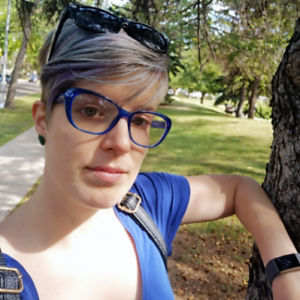 BIOS: Ariel Kroon and Christina De La Rocha are non-fiction editors at Solarpunk Magazine.
BIOS: Ariel Kroon and Christina De La Rocha are non-fiction editors at Solarpunk Magazine.
Ariel (she/her) is a recent PhD in English Literature, specifically in the field of Canadian post-apocalyptic science fiction published between 1948 and 1989. In addition to academic interests in feminist posthumanism and affect theory, she enjoys and pursues speculative futures with an environmental bent, queer optimism, radical hope, and garden dirt. She is an ancient Tumblrkid and hugely appreciative of solarpunk and hopepunk communities. You can find some of her talks on YouTube or read her personal webpage. Â
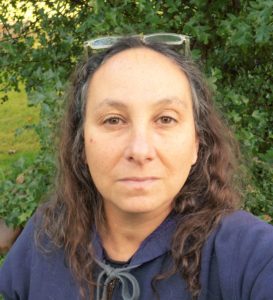 Christina, a recovering biogeochemist and oceanographer raised in Los Angeles, California, has washed up on the shores of northern Germany and lives in a settlement with notably more chickens, cows, and alpacas in it than people. She has published a pop sci book or two, has had a few stories and articles published in Analog, tries to be entertaining on Twitter (@xtinadlr), and occasionally updates her website.
Christina, a recovering biogeochemist and oceanographer raised in Los Angeles, California, has washed up on the shores of northern Germany and lives in a settlement with notably more chickens, cows, and alpacas in it than people. She has published a pop sci book or two, has had a few stories and articles published in Analog, tries to be entertaining on Twitter (@xtinadlr), and occasionally updates her website.
If you’re an author or other fantasy and science fiction creative, and want to do a guest blog post, please check out the guest blog post guidelines. Or if you’re looking for community from other F&SF writers, sign up for the Rambo Academy for Wayward Writers Critclub!
...
It’s so easy to feel overwhelmed by”¦ everything right now.
Climate change, the rise of authoritarianism, the economy, systemic racism, a global pandemic. Social media (which arguably has never been a showcase for the best humanity has on offer) has become a doom scroll. The news headlines aren’t comforting either, obviously, as that’s not their job, but feel even less so this year.
Meanwhile, Life with a capital L keeps happening. We all still have to keep a roof over our heads, some of us have kids to feed and prepare for whatever the hell it is that lies ahead, or parents to support in their old age, or maybe even both. An appalling number of us have to fight daily just for the right to exist.
And worst of all, I think, is that it is the year 2020. There’s something extra galling about the fact that we’re nearly a quarter way through the 21st century and we literally have access to the sum total of the world’s knowledge in our pockets”¦ and yet we seem to be inundated with both egregious ignorance and aggressive gullibility. Never mind a jet pack, I’d be happy just to get everyone on the same damn page: Clean air good, pollution bad.
 On my darker days, I tend to turn to accounts from other people who lived through uncertain or frightening times. Victor Frankl’s Man’s Search for Meaning comes to mind, or going further back, something like Pandaemonium by Humphrey Jennings. An obvious place to look for historical parallels right now is back to our most famous pandemic, even if our perception of those times isn’t entirely accurate. These books and essays don’t offer answers, per se, but they do provide that all important connection: other people have been in a crucible and survived, and maybe you can too.
On my darker days, I tend to turn to accounts from other people who lived through uncertain or frightening times. Victor Frankl’s Man’s Search for Meaning comes to mind, or going further back, something like Pandaemonium by Humphrey Jennings. An obvious place to look for historical parallels right now is back to our most famous pandemic, even if our perception of those times isn’t entirely accurate. These books and essays don’t offer answers, per se, but they do provide that all important connection: other people have been in a crucible and survived, and maybe you can too.
But what can you do beyond just get by? These problems we’re facing seem so big and intractable. You’re just one person, right?
Listen: One person can make a difference.
Here’s how I know. On May 16th, 2020, more than 5000 volunteers in my community, following physical distancing protocols and wearing masks, collected at least 678,200 pounds””yes pounds, and no that amount is not a typo””of food, donated by residents who had been asked to leave a non-perishable item on their porch or front step for collection.
The goal was to restock local food banks, because donations had tailed off due to the pandemic lockdown. Organizers called it the May 16th Miracle, and the whole effort was put together in less than three weeks via social media and the now ubiquitous Zoom.
The Miracle”¦ was just one person’s idea.
It was not a government initiative, it wasn’t put together by a big non-profit organization, and it had no budget for publicity. One person saw that others were hurting, reached out to a few other people who would be able to recognize the same need, and this small group of people then put out the call to the community at large. And wow, did the community respond.
Even better, a neighbouring community was so inspired by the effort that they organized their own miracle and brought in even more donations for their food banks.
I took part in the May 16th Miracle as an area “˜captain,’ and the experience of collecting bag after bag of goods from my neighbours, and then joining the huge convoy en route to a makeshift warehouse has sustained me ever since. I’ve started noticing quiet success stories all over the place: the Facebook gardening group members giddily sharing pictures of the monarch caterpillars they’re now seeing in the gardens they’ve overhauled to include native species; the grassroots pressure that forced universities and other institutions to divest from oil and gas holdings; the proliferation of Pride rainbow crosswalks in even those most conservative of towns; colonial-era statues finally, finally coming down.
Yes, it’s 2020. No, we shouldn’t have to still be fighting these fights. But what you’re doing, however big or small your contribution, is working. Indeed, there wouldn’t be so much pushback if it weren’t.
Keep going. Double down if you can. It matters.
You matter.
 BIO: Chandra Clarke (she/her) is the author of the Pundragon (available August 10), a cli-fi book disguised as a humorous fantasy. You can find her blog at www.chandrakclarke.com or say hi on Twitter at @chandraclarke.
BIO: Chandra Clarke (she/her) is the author of the Pundragon (available August 10), a cli-fi book disguised as a humorous fantasy. You can find her blog at www.chandrakclarke.com or say hi on Twitter at @chandraclarke.
If you’re an author or other fantasy and science fiction creative, and want to do a guest blog post, please check out the guest blog post guidelines. Or if you’re looking for community from other F&SF writers, sign up for the Rambo Academy for Wayward Writers Critclub!
...
“But ser,” broke in one of the deckpaws. “The greatest jewel in the world is said to be guarded by the fearsome kraken, as tall as the queen’s castle with tentacles longer than ten vessels nose to tail!”
“Which is why, m’dear, we not be partakin’ of the flesh of the inkton,” Cinrak explained. “Kraken’s cousins have proven intelligent and good friends of Rodentkind. Friends not be eatin’ friends. The mer archives tell us, yes, once beasts of Kraken’s size did exist. It be not our place to tempt The Depth’s wrath.”
The entire crew undulated two digits in a v shape of warding.
– “Search for the Heart of the Ocean”
In Thor: Ragnarok, a motley collection of hunters challenges a confused Thor with, “Are you friend, or are you food?” It’s a play on the hail “friend or foe,” building a dangerous world reveling in its violence and cannibalism in one swift sentence.
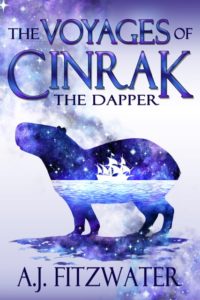 Cinrak’s rodent pirate world is one of fun, love, silliness, and respect. I wanted to create a through line about balance in community, nature, body, and spirit. What if pirates oversaw the equal distribution of resources? What if trans people had easy and equitable access to the health care they deserve? What if the monarchy answered to the people? What would keeping balance in the oceans look like?
Cinrak’s rodent pirate world is one of fun, love, silliness, and respect. I wanted to create a through line about balance in community, nature, body, and spirit. What if pirates oversaw the equal distribution of resources? What if trans people had easy and equitable access to the health care they deserve? What if the monarchy answered to the people? What would keeping balance in the oceans look like?
As the quote above suggests, respect for the sapience of ocean creatures is baked (see: puns most definitely intended in this book) into the myths, legends, and superstitions of Rodentdom. The great kraken, the protector of sea creatures, has not been seen for hundreds of years. Rather than take this as carte blanche to chow down on the crumbed calamari with chili sauce, the rodents ask what so upset the balance of life that an entire species would suddenly disappear.
In early drafts, I made strong points about climate change and over-fishing disturbing not just the way of life, but magic. This too upset balance; the sweetness and respect for letting the world building bleed in from the edges and the unspoken had been compromised. Opting for a softer approach, I let the silent Agnes””the enormous kraken of myth””speak for herself. She forms a bond with one of Cinrak’s crew, shows them the wonders of the ocean, and becomes a mascot to the Impolite Fortune. Playful as a puppy, and knowing her worth, Agnes unapologetically takes up space. She just wants to hug… the whole ship.
Agnes becomes the herald in “The Hirsute Pursuit.” Her link to the ocean grapevine (seawood tangle?) allows her to be first with the news that a once in a generation harvest is ready. This story introduces another significant piece of Rodentdom’s ecosystem: a food source with properties that acts like hormone replacement for trans people. The only magic in this microcosm is how it has been guarded to ensure equal distribution of resources. Are the fairies rodent-flesh eaters? Their biology and behavior suggest something to that effect in their distant past. Or they could have found a solution to defending their land against colonial invasion. Either way, when left alone they understand and undertake balance, sharing their bounty with the rodents.
The Voyages of Cinrak the Dapper is full of women who enjoy their food. Not for the spectacle of observers, but for pleasure and the nourishment of their bodies. As a pirate captain, Cinrak understands keeping her crew full, fit, and happy is a tool for community bonding and efficient livelihood. The food is in the detail. No one goes without a good cup of tea, or breakfast.
Including Agnes. Who cronches that shark with relish (pun alert!). Because she knows who is friend and who is food.
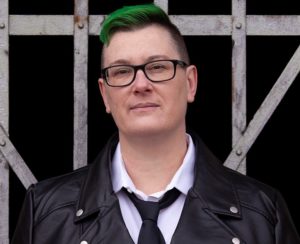 BIO: AJ Fitzwater lives between the cracks of Christchurch, New Zealand. Their work focuses on feminist and queer themes, and has appeared in venues of repute such as Clarkesworld, Beneath Ceaseless Skies, Shimmer, Giganotosaurus, GlitterShip, and in various anthologies. They are the author of rodent pirate escapades in The Voyages of Cinrak the Dapper and the WW2 land girls shapeshifter novella No Man’s Land. With a background in radio, AJ lends their voice to podcast narrations, including for the Escape Artists universe. They enjoy maintaining a collection of bow ties. A unicorn disguised in a snappy blazer, they tweet @AJFitzwater. Their website is pickledthink.blogspot.com.
BIO: AJ Fitzwater lives between the cracks of Christchurch, New Zealand. Their work focuses on feminist and queer themes, and has appeared in venues of repute such as Clarkesworld, Beneath Ceaseless Skies, Shimmer, Giganotosaurus, GlitterShip, and in various anthologies. They are the author of rodent pirate escapades in The Voyages of Cinrak the Dapper and the WW2 land girls shapeshifter novella No Man’s Land. With a background in radio, AJ lends their voice to podcast narrations, including for the Escape Artists universe. They enjoy maintaining a collection of bow ties. A unicorn disguised in a snappy blazer, they tweet @AJFitzwater. Their website is pickledthink.blogspot.com.
Purchase The Voyages of Cinrak the Dapper from your preferred retailer or directly from Queen of Swords Press.
If you’re an author or other fantasy and science fiction creative, and want to do a guest blog post or video interview, please check out the guest blog post guidelines. Or if you’re looking for community from other F&SF writers, sign up for the Rambo Academy for Wayward Writers Critclub!
...
Feminism
Laura Hudson discusses The Big Sexy Problem with Superheroines and Their ‘Liberated Sexuality’ at Comics Alliance.
Melissa McEwan discusses The Terrible Bargain We Have Regretfully Struck for Shakesville.
Politics
The Elizabeth Warren Quote every American needs to see.
Bill CLinton says GOP Climate Change denial affects America’s image abroad
Kung Fu Monkey talks about why he misses Republicans
Technology
This is a really cool project based here in Seattle, Health Month. It’s making a game out of achieving your goals, getting so many points for each one met. It connects with the Fitbit, which I have and love, which also uses geeky addiction to numbers as motivation to get fit.
A tool that I’m still exploring, ifttt. Basically use if/then statements to create actions triggered by web events that come from channels such as Twitter, Facebook, Instragram, e-mail, the weather, etc.
Mark Zuckerberg appeared at the Facebook developers conference to discuss Timeline, which supplies a new appearance for Facebook.
Samuel L. Ipsum is a lively alternative to the traditional filler text, Lorem Ipsum.
Writing
Are you a spec-fic editor that needs slush readers? Drop me info in the comments so I can add you to the list I’m compiling here on Google+.
Kurt Vonnegut’s advice for short story writers
...
Want access to a lively community of writers and readers, free writing classes, co-working sessions, special speakers, weekly writing games, random pictures and MORE for as little as $2? Check out Cat’s Patreon campaign.

"(On the writing F&SF workshop) Wanted to crow and say thanks: the first story I wrote after taking your class was my very first sale. Coincidence? nah….thanks so much."

In this Medium article, Cat Rambo talks about how she tries to control her year in order to hit her writing goals.


This site is protected by reCAPTCHA and the Google Privacy Policy and Terms of Service apply. This site is a participant in the Amazon Services LLC Associates Program, an affiliate advertising program designed to provide a means for sites to earn advertising fees by advertising and linking to Amazon.com.